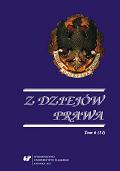O prawie karnym pod okupacją radziecką (1939—1945)
On a criminal law on the borderland of the Second Republic of Poland under the Soviet occupation (1939—1945)
Author(s): Adam LityńskiSubject(s): Law, Constitution, Jurisprudence
Published by: Wydawnictwo Uniwersytetu Śląskiego
Summary/Abstract: About a half of the territory of the Second Republic of Poland was under the occupation of the USSR after 17 September 1939, as a result of the Russian aggression and German-Russian agreement. The Soviet law was imposed on the territories occupied and included into the USSR right away. Polish citizens were massively repressed, and, typically of the communist system — to a large extent with the use of the criminal law and courts. However, the majority was “judged” in absentia and not by the court, but an administrative body, namely the body appointed by the secret body, it being NKWD. In such a way, during the meeting of the Political Bureau of the All-Union Communist Party of Bolsheviks a decision on murdering 26 thousand officers and other Polish prisoners in prisoner camps and USSR prisons was made. After USSR aggression on Poland on 17 September 1939, deportations, arresting, tortures in the course of inquiries, and executing Polish citizens, above all Poles, continued incessantly until the outbreak of the German-Russian war on 22 June 1941. Whole families were transported to Siberia, usually distanced from men. Careful calculations these days reach about 500 thousand people of the Polish nationality killed or died on the Eastern Borderland. At the end of the war and right after it, at least 85-100 thousand Poles (excluding former Polish citizens of other nationalities) were repressed in the territories belonging to the Second Republic of Poland from January 1944 to the end of 1940s.
Journal: Z Dziejów Prawa
- Issue Year: 14/2013
- Issue No: 6
- Page Range: 151-173
- Page Count: 23
- Language: Polish

